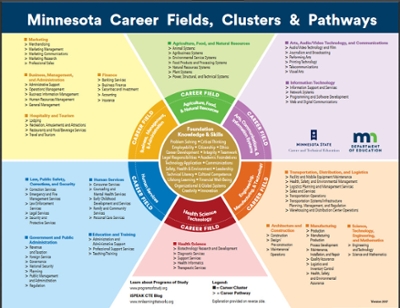About Career Clusters
Where do you start when choosing a career? With the number of career choices out there, it helps to organize your options.
Career clusters are one way to group career choices. Careers with common features are in the same cluster. Clusters can be used during career exploration as a way to find your best career match.
Explore the Career Clusters
Six career fields are the broadest level of career options. They are shown at the

Download the 8.5x11 letter size poster (pdf)
Download the 18x24 poster (pdf)
Source: Career and Technical Education
Underneath those six career fields are the 16 career clusters identified by the National Career Clusters Framework. In addition, some models also include the Energy Systems cluster. Careers with the same knowledge and skills are grouped in the same cluster. Each cluster may include hundreds of different careers.
Each career cluster includes one or more of 81 career pathways. A pathway is a group of related career specialties within the career cluster. Examples of pathways include:
- Buying and merchandising
- Design/pre-construction
- Family and community services
- Financial and investment planning
- Food products and processing systems
- Health informatics
- Manufacturing production process development
- Marketing
- Network systems
- Teaching/training
A pathway has its own knowledge and skill requirements. Educational programs can be developed around each pathway. They include curriculum that helps learners prepare for a career. Programs of study are sequential and based on industry expectations and skill standards. Career pathways show learners of all ages which courses will give them the specific knowledge, skills, and abilities needed to pursue their career choice.
The
The knowledge and foundation skills needed for academic and technical literacy are:
- Employability
- Ethics
- Systems
- Teamwork
- Career development
- Problem solving
- Critical thinking
- Information technology application
- Legal responsibilities
- Communication
- Safety, health, and environment
- Social studies
- Math
- Science
- English
- Personal finance
If you don't know how to start, take the Career Clusters Interest Survey. It asks some simple questions to match your interests to career clusters.
Benefits of Career Clusters
Why use career clusters to explore careers and plan your future? Thinking ahead and preparing for careers is helpful if you are headed to the workplace or college. Some careers that are common today may not be needed tomorrow. And all careers require flexibility, knowledge, and skills.
- Think big. Career clusters help you take a broad look at your options through six career fields and the options within each field.
- Get excited. Choices seem endless, but remember you're in control. Exploring clusters can get you excited about your options as you discover what's best for you.
- Save time. Exploring groups of similar occupations
helps you select and eliminate choices more quickly than researching many individual occupations. - Spend wisely. Make wise decisions about what you're going to study. Don't declare a major quickly and then realize halfway through the program that a different career interests you more.
- Take control. Base your career choice on your own dreams and interests. Career clusters help you learn about all the types of careers available so you don't leave the decision to chance.
- Stand out. Grab employers' attention by knowing the skill requirements and knowledge for specific fields and jobs.


